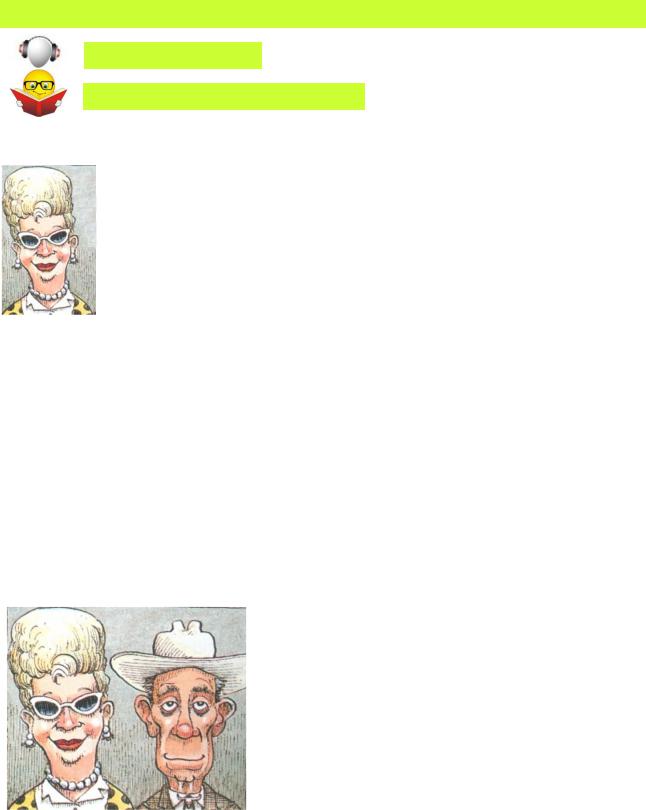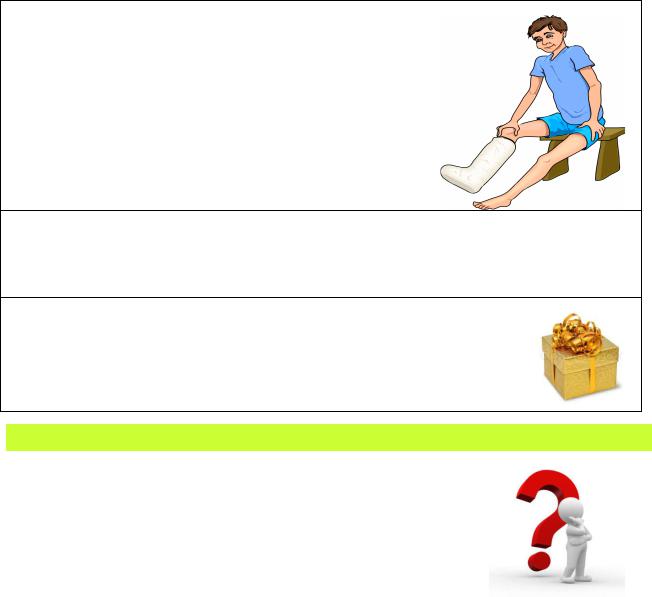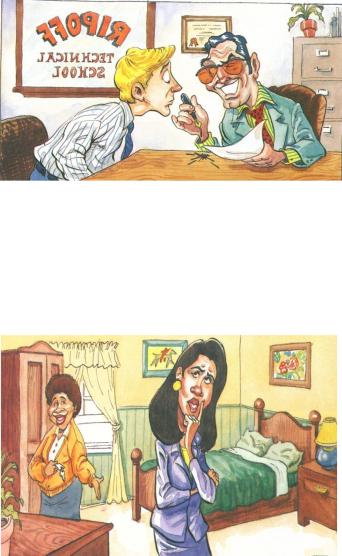
SEMESTR_2_DLYa_PEChATI__ChAST_2
.pdf
UNIT 7
A TRIP TO THE OLD COUNTRY
71

I. LISTENING AND READING
Listen to the text
Read and translate the text
A TRIP TO THE OLD COUNTRY
Minnie Bronson lives in Texas, but she was born in England. When she was eighteen, she married an American and they moved to the United States. That was forty years ago and she’s never been to England since then. She is planning a trip to England. She wrote a letter to her brother. Her nephew, Oliver, replied.
42 Edgehill Road
Thetford, Norfolk
England
October 10th
Dear Aunt Minnie,
Thank you for your letter. What a surprise! We thought you were dead. I’m afraid that my father (your brother Donald) died ten years ago. We didn’t know your address. But we are living in the same house. Of course, you’ve never met me, but my father often spoke about you. We are very glad you want to come to England. Things have changed in Thetford since you were a girl. Will you be able to come and see us? You will be very welcome.
Very best wishes. Your nephew, Oliver
Dear Ollie,
I can call you Ollie, can’t I? I was very sorry to hear about poor Donald. My husband Hiram and I will arrive in England on December 12.Will you be able to meet us at the airport? I hope so. Hiram will be too tired to drive after a long flight, and I cannot drive.
I enclose a photo of Hiram and me, so you will be able to recognize us. We’ll be able to stay with you for two or three weeks. That will be nice,
won’t it? We can spend Christmas together. Then we’ll visit Hiram’s cousin in Ireland. He wants us to stay with him for a month. We’d like to visit a lot of places in Britain – Buckingham Palace, the Tower, Oxford, Stratford, Scotland, Wales. You’ll be able to drive us, won’t you? We hope to hear from you soon.
With best regards,
Auntie Minnie (Hiram sends his love too)
72

II. NOTES
|
|
Ireland [ˈaɪələnd] |
Ирландия |
|
|
|
|
Buckingham Palace [ˌbʌkɪŋəm ˈpælɪs] |
Букингемский дворец |
|
|
|
|
Tower [ˈtaʊə] |
Тауэр |
|
|
|
|
Oxford [ˈɒksfəd] |
Оксфорд |
|
|
|
|
Stratford [ˈstræfəd] |
Стрэтфорд |
|
|
|
|
Scotland [ˌskɒtlənd] |
Шотландия |
|
|
|
|
Wales [ˈweɪlz] |
Уэльс |
|
|
|
|
|
|
|
|
|
|
|
III. VOCABULARY |
|
|
|
|
|
|
|
|
1. |
surprise [səˈpraɪz] |
сюрприз |
|
||
|
|
|
What a surprise! |
Какой сюрприз! |
|
|
2. |
to be dead [ded] |
быть мертвым |
|
|
|
3. |
to die [daɪ] |
умирать |
|
|
|
|
|
My father Donald died ten years ago. |
Мой отец Дональд умер 10 лет |
|
|
|
|
|
назад. |
|
|
4. |
to be able [ˈeɪbl] to do smth |
быть в состоянии сделать ч-л |
|
|
|
|
|
Will you be at able to meet us at the |
Ты сможешь встретить нас в |
|
|
|
|
airport? |
аэропорту? |
|
|
5. |
wish [wɪʃ] |
пожелание |
|
|
|
|
|
Best wishes. |
С наилучшими пожеланиями. |
|
|
6. |
poor [pɔː] |
бедный |
|
|
|
|
|
poor health [helθ] |
плохое здоровье |
|
|
7. |
to hope [həʊ] |
надеяться |
|
|
|
|
|
I hope you will be able to drive us there. |
Я надеюсь, ты сможешь нас туда |
|
|
|
|
|
отвезти. |
|
|
8. |
to enclose [ɪnˈkləʊz] |
прилагать |
|
|
|
|
|
I enclose my photo to the letter. |
К письму я прилагаю своё фото. |
|
|
9. |
to recognize [ˈrekəɡnaɪz] |
узнавать |
|
|
|
|
|
You will be able to recognize us. |
Ты сможешь узнать нас. |
|
|
|
10. Christmas [ˈkrɪsməs] |
Рождество |
|
|
|
|
|
We can spend Christmas together. |
Мы сможем провести Рождество |
|
|
|
|
|
вместе. |
|
|
|
11. to hear from smb |
получать известия от к-л |
|
|
|
|
|
We hope to hear from you soon. |
Мы надеемся вскоре получить от |
|
|
|
|
|
вас известия. |
|
|
|
12.With best regards [regardz] |
С наилучшими пожеланиями |
|
|
|
|
13. to send one’s love |
передавать привет |
|
|
|
|
|
Your uncle sends his love too. |
Ваш дядя тоже передаёт привет. |
|
|
|
|
73 |
|
|

IV. COMPREHENSION CHECK
ANSWER THE QUESTIONS:
1.Where was Minnie Bronson born?
2.Why did she move to the United States forty years ago?
3.Why did she write a letter to England?
4.Who replied to her letter?
5.Was Oliver’s family surprised to get a letter from his aunt Minnie?
6.Why didn’t they write to Minnie about her brother’s death?
7.Will Minnie be able to visit England? When will she and her husband arrive?
8.Will Hiram be able to drive from the airport?
9.Will Oliver be able to recognize Minnie and Hiram at the airport? Why?
10.How long will they be able to stay with Oliver?
11.What places do they want to visit in England?
V. GRAMMAR
ОБОРОТ TO BE ABLE TO
Модальный глагол can имеет две временные формы: настоящего времени – can и прошедшего времени – could. Модальный глагол can может заменяться эквивалентом to be able to (быть в состоянии).
To be able to несколько отличается по своему значению от модального глагола can. Eсли саn обозначает способность/возможность совершать
действие вообще, то оборот to be able to – возможность совершить действие в данном конкретном случае, в данное определенное время.
.
PAST SIMPLE
Различие между глаголом can и его эквивалентом особенно проявляется в прошедшем времени.
ВООБЩЕ |
|
В ДАННОМ КОНКРЕТНОМ |
|
|
СЛУЧАЕ |
COULD |
|
WAS/ WERE ABLE TO |
|
|
|
When I was in the |
|
When I was in the |
USA I could see |
|
USA I was able to |
American movies on |
|
see «Gone with the |
TV. |
|
Wind». |
Когда я был в США, я мог смотреть |
|
Когда я был в США, я смог |
американские фильмы по ТВ. |
|
посмотреть «Унесенные ветром». |
|
74 |
|

ОБРАТИТЕ ВНИМАНИЕ:
1.В прошедшем времени в отрицании в обоих случаях чаще используется модальный глагол could в отрицательной форме couldn’t.
He was so surprised that he couldn’t say a word.
Он так удивился, что не смог сказать ни слова.
2. С глаголами see, hear, feel, smell, taste, understand, remember, guess в прошедшем времени используется только модальный глагол could (никогда was/ were able to!)
I could feel that something was wrong the moment I entered the room.
Я почувствовал, что что-то не так, как только вошел в комнату.
PRESENT SIMPLE
В настоящем времени для обозначения способности совершать действия и «вообще» и «в данном конкретном случае», как правило, употребляется модальный глагол can.
ВООБЩЕ |
В ДАННОМ КОНКРЕТНОМ |
|
СЛУЧАЕ |
I can play tennis very well. |
I can play tennis right now. |
Я очень хорошо умею играть в теннис. |
Я могу сыграть теннис прямо |
|
сейчас. |
ОБРАТИТЕ ВНИМАНИЕ:
В некоторых случаях, когда необходимо противопоставить способность к совершению действия «вообще» и «в данном конкретном случае», используется эквивалент am/ is/ are able to.
ВООБЩЕ |
В ДАННОМ КОНКРЕТНОМ |
|
СЛУЧАЕ |
CAN |
AM/ IS/ ARE ABLE TO |
|
|
75

He can play football well, but is not able to play it today
because he has hurt his leg.
Он хорошо играет в футбол, но сегодня не может этого сделать,
так как поранил ногу.
FUTURE SIMPLE
Для обозначения способности совершить действие в будущем используется will be able to.
I will be able to buy a gift for my girlfriend tomorrow.
Завтра я смогу купить подарок своей девушке.
EXERCISES
1. Make the sentences negative and interrogative.
A.Example: She will be able to talk to me soon. - She will not be able to talk to me soon. Will she be able to talk to me soon?
1. My friend will be able to speak three languages when he graduates next year.
2. I will be able swim across the river when I grow up.
3. I will be able to use the computer when I finish the course.
4. We will be able to order our meal in English today when we complete this course. 5. Bill will be able to meet you at the airport tomorrow.
6. Nick will be able to translate this sentence if he revises his grammar. 7. His girlfriend will be able to play the piano at the concert next month. 8. My brother’s leg is in plaster, but he will be able to walk soon.
9. I will be able to run faster than my brother if I work out regularly.
B.Example: Linda is able to join us today. - Linda is not able to join us today. Is Linda able to join us today?
1. He is able to meet you at the airport.
2. We are able to recognize you by the photo.
3. She is able to spend Christmas with her children.
76

4.I am able to walk now.
5.They are able to use their computer.
6.He is able to run faster than anyone else.
7.I am able to do this work.
8.The teacher is able to help me now.
9.You are able to pass your driving test.
C. Example: I was able to answer all the questions of the test. - I was not able to answer all the questions of the test. Was I able to answer all the questions of the test?
1.Though it was dark, the boy was able to find his way home.
2.She was able to type the letter without mistakes.
3.My friends were able to meet me when I arrived.
4.My cousin was able to recognize me when we met.
5.Richard was able to stay two weeks with his parents.
6.Last year they were able to spend Christmas with their family.
7.My brother was able to take part in a football match last week.
8.Linda and Jim were able to watch the show yesterday.
9.My sister was able to pass the test.
2.Complete the sentences with could/couldn’t or was/were able to. Example: The fire spread quickly, but everyone was able to escape.
1.He had hurt his leg, so he … walk very well.
2.She wasn't at home when I called, but I …contact her at her office.
3.It took us a long time, but we … persuade him.
4.My sister had taken music lessons so she … play the piano very well at the concert last week.
5.My father … meet me at the airport yesterday, because he was busy in the office.
6.The police chased the thieves but they … escape.
7.I looked everywhere for the book but I … find it.
8.They didn’t have any tomatoes in the first shop, but I … find them in the next shop.
9.The boy fell into the river, but fortunately we … rescue him.
10.Tom … drive but he didn’t have a car.
11.She … sing beautifully in her childhood.
12.I … understand English and German when I was a child.
77

13.She can’t run very fast now, but when she was at school she … run faster than anyone else.
14.My grandfather can’t swim far these days, but ten years ago he … swim across the lake.
15.Jack was an excellent tennis player, he … beat anyone.
16.When I arrived, I … see a few people waiting for the train.
17.After saving their money for ten years, they … buy a house for themselves.
18.Sam and Beth … speak Italian fluently, couldn’t they?
19.… you tie your shoelaces when you were four years old?
20.It was a very tricky question, but Paul … answer it.
21.I … hear what they were saying because the music was too loud.
22.Though it was difficult, the children … build a tree house.
3. Use the prompts to react to the situations.
Example: Peg can’t call you tonight (tomorrow). – I hope she will be able to call tomorrow.
1.Bob can’t come to the party (next Saturday).
2.They can’t repair my car (by the end of the month).
3.My dad can’t come to school tomorrow (next week).
4.They can’t translate this text without a dictionary (next year).
5.Ann can’t do this work today (tomorrow).
6.George can’t go to Spain this summer (next summer).
7.He can’t get a good job (before summer is over).
8.She can’t dance very well (in about a month).
9.She can’t visit you tonight (on Monday).
10.We can’t have a barbecue today (tomorrow).
4.Look at the picture of this family. Then use the prompts to make sentences. Example: They can’t enjoy peace and quiet now. When the children grow up, they will be able to enjoy peace and quiet.
1.enjoy peace and quiet
2.go out in the evenings
3.do lots of sports
4.visit their friends often
5.go to the theatre with their friends
6.relax on the beach
7.read new books and magazines
8.travel to exotic countries
9.spend time on their own
78

5. Complete the dialogues with will/will not be able to. Dialogue A
Principal: Why do you want to study computer programming?
Robbie: Well, I lost my job last month, and I can’t find another one. Principal: I see. … you … to pay for the course? Do you have any money? Robbie: Well, some. And my girlfriend … to help me.
Principal: Good. The course costs $2,500.
Robbie: Whew! …I … to find a job as a computer programmer?
Principal: Oh, sure. You … to get a good job and make a lot of money… Please, sign here.
Dialogue B
Landlady: This is the room. Do you like it?
Lois: It’s very nice. Is it quiet? I am a writer.
Landlady: You … to work with no problem. There’s almost no noise here. Lois: … I … to use the kitchen? Landlady: Yes, of course.
Lois: Fine, it looks good. (Crash!) Landlady: Oh, that’s just our
neighbor. He works on old cars. He is usually quiet.
6. Translate the sentences.
1.Я не смог написать тебе, потому что не знал твоего адреса.
2.Боюсь, я не смогу отвезти вас туда.
3.Я надеюсь, мой брат сможет пробыть у нас три недели.
4.Я не смог быть у них на прошлое Рождество.
5.К письму он приложил фото, поэтому мы смогли узнать его, когда встретились.
6.Я смогу пользоваться кухней?
7.Я не смог встретить вас в аэропорту, так как был занят.
8.Обычно я хорошо играю в футбол, но сегодня не могу этого делать, так как моя нога сломана.
9.Он не смог услышать телефонный звонок, так как был в ванной.
79
10. Он не смог заплатить за курсы в прошлом месяце.
7. |
Choose the right variant. |
|||||
1. |
I … understand what he was saying because he was speaking Spanish. |
|||||
A. couldn’t B. can’t |
C. can |
|||||
2. |
Steven … walk when was one year old. |
|||||
A. can’t |
B. can |
C. could |
|
|||
3. |
The door was locked so I … go inside. |
|||||
A. will be able to |
B. wasn’t able to C. could |
|||||
4. |
- … I go on holiday with my friends this year? – I’m afraid, you can’t. You’re too |
|||||
young. |
|
|
|
|
|
|
A. Am I able |
B. Was I able to C. Can |
|||||
5. |
When I am older, I … live by myself. |
|||||
A. can’t |
B. will be able to |
C. will able to |
||||
6. |
I … run faster than my brother now. |
|||||
A. will be able to |
B. could |
C. can |
||||
7. |
I … hear you very well. Please, speak louder. |
|||||
A. am able to |
B. can |
C. can’t |
||||
8. |
My brother … drive yet, he’s too young. |
|||||
A. can |
B. can’t |
C. couldn’t |
||||
9.It was dark, so I … see very well. A. couldn’t B. can’t C. wasn’t able to
10.She … hear somebody playing the piano in the next room.
A. was able B. was able to C. could
80
